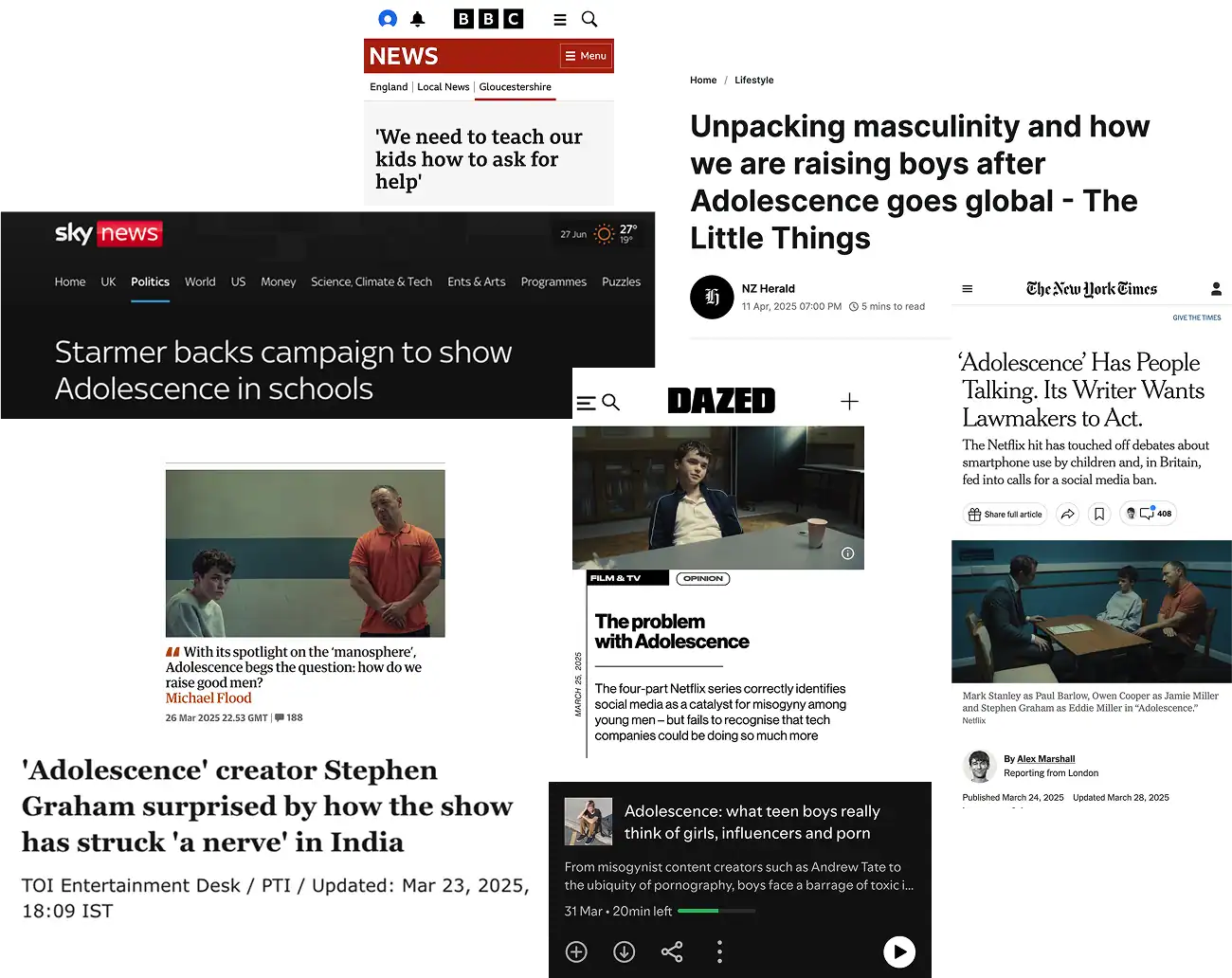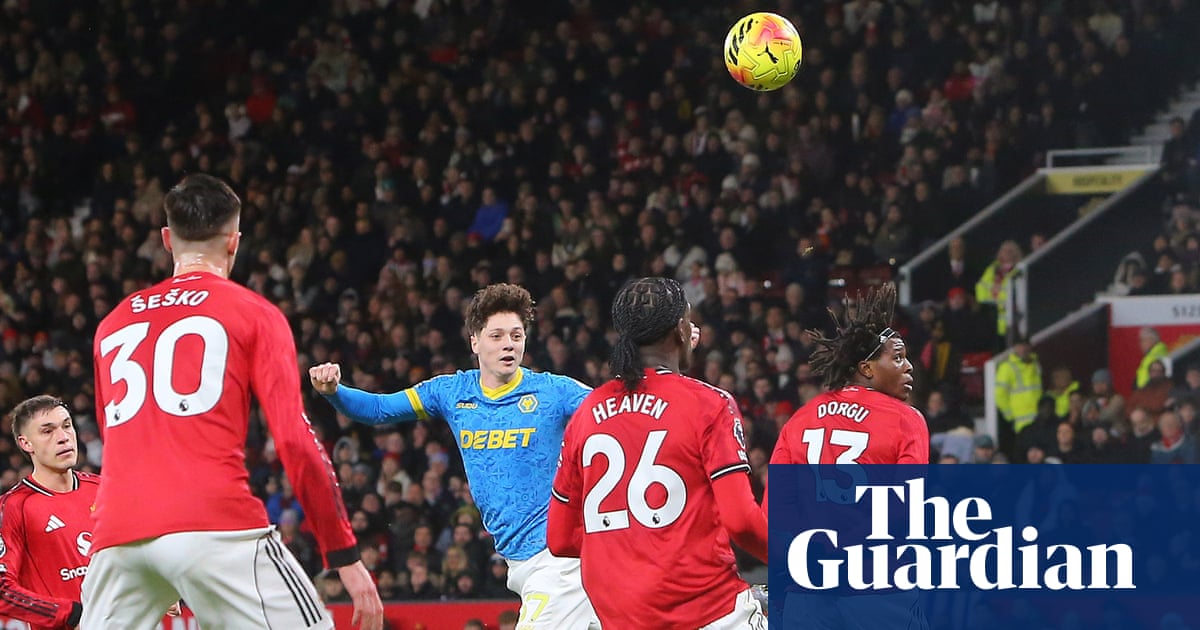Click to continue
or use your arrow keys
This article contains audio

You are on slide 1 of chapter 1. Use right arrow to continue. Alternatively, use the open square bracket key and close square bracket key to navigate, and disable left arrow and right arrow key navigation.
Click left to go back or use the left arrow key
Click right to go forward or use the right arrow key
You are on slide 2 of chapter 1. Use right arrow to continue. Alternatively, use the open square bracket key and close square bracket key to navigate, and disable left arrow and right arrow key navigation.
The 'manosphere' – a loose but large group of influencers making content aimed at men – is often described as a dark corner of the internet filled with right-wing politics and misogyny.
There are thousands of voices in this space, but one is better known than the others.
You are on slide 3 of chapter 1. Use right arrow to continue. Alternatively, use the open square bracket key and close square bracket key to navigate, and disable left arrow and right arrow key navigation.
This article contains audio
video credit: Rumble | tatespeech

Video progress
You are on slide 4 of chapter 1. Use right arrow to continue. Alternatively, use the open square bracket key and close square bracket key to navigate, and disable left arrow and right arrow key navigation.
Why did Andrew Tate’s message ‘click’ for teenage boys, despite its well-known toxicity?
We asked some. They agreed to speak on condition of anonymity so their faces are disguised.
You are on slide 5 of chapter 1. Use right arrow to continue. Alternatively, use the open square bracket key and close square bracket key to navigate, and disable left arrow and right arrow key navigation.
This article contains audio
You are on slide 6 of chapter 1. Use right arrow to continue. Alternatively, use the open square bracket key and close square bracket key to navigate, and disable left arrow and right arrow key navigation.
While algorithms flooded some people's social media feeds with Andrew Tate content, others won't have seen any of his videos.
But most people have heard about him: 77% of British people know who he is, according to a 2025 survey. The cases against Tate for crimes including human trafficking and rape in both Romania and the UK, allegations Tate denies, have also been widely reported.
The conversation about Tate, however, often misses the full spectrum of his messaging. What is he offering young men?
We looked at his videos to find out.
You are on slide 7 of chapter 1. Use right arrow to continue. Alternatively, use the open square bracket key and close square bracket key to navigate, and disable left arrow and right arrow key navigation.
What is best-known about Tate are his views on women: he has described himself as a misogynist. But when we used a GenAI LLM to analyse transcripts of 640 videos from his channel on video site Rumble, we found that though Tate talks about women a lot, they’re not his biggest topic.
We found that women came up a significant amount in about a fifth (21%) of his videos (highlighted in blue below).
This is an example of a phrase that we identified as being about women:


You are on slide 8 of chapter 1. Use right arrow to continue. Alternatively, use the open square bracket key and close square bracket key to navigate, and disable left arrow and right arrow key navigation.
But the topic Tate returns to much more frequently? Being rich.
In twice as many videos (43%), he talks a significant amount about being rich, getting rich and other words related to success and money.
This is a sentence we classed as being about success:


You are on slide 9 of chapter 1. Use right arrow to continue. Alternatively, use the open square bracket key and close square bracket key to navigate, and disable left arrow and right arrow key navigation.
You only need to watch a few videos to find examples of Tate telling you how rich he is.
You are on slide 10 of chapter 1. Use right arrow to continue. Alternatively, use the open square bracket key and close square bracket key to navigate, and disable left arrow and right arrow key navigation.
This article contains audio
video credit: Rumble | tatespeech

Video progress
You are on slide 11 of chapter 1. Use right arrow to continue. Alternatively, use the open square bracket key and close square bracket key to navigate, and disable left arrow and right arrow key navigation.
The young men we spoke to acknowledge the appeal.
You are on slide 12 of chapter 1. Use right arrow to continue. Alternatively, use the open square bracket key and close square bracket key to navigate, and disable left arrow and right arrow key navigation.
This article contains audio
You are on slide 13 of chapter 1. Use right arrow to continue. Alternatively, use the open square bracket key and close square bracket key to navigate, and disable left arrow and right arrow key navigation.
Tate doesn’t just talk about being rich. His videos are full of status symbols.
We ran image analysis on his videos and found that in almost two-thirds (60%) he or someone else smokes a cigar, and a third (34%) feature sports cars.
You are on slide 14 of chapter 1. Use right arrow to continue. Alternatively, use the open square bracket key and close square bracket key to navigate, and disable left arrow and right arrow key navigation.
Something else jumps out visually: his torso. Almost half of these videos (43%) feature a topless man. Our analysis didn’t identify individuals but reviewing the videos shows it’s usually Tate.
You are on slide 15 of chapter 1. Use right arrow to continue. Alternatively, use the open square bracket key and close square bracket key to navigate, and disable left arrow and right arrow key navigation.
Andrew Tate didn’t invent bragging about being rich. Or taking his top off.
But the enormous success of his videos in 2020-21 helped popularise a blueprint for a generation of influencers making content aimed at men.
Discussing Tate’s impact on the manosphere, Anki Deo, a senior policy officer at non-profit Hope not Hate says that this type of content used to be more niche:
There is a debate now as to whether [the manosphere] still exists in its original form, which was this quite niche, private, cut-off space. What figures like Andrew Tate have done is mainstreamed that”
Now there are many thousands of influencers putting out a similar message featuring the same carousel of symbols such as yachts, Lamborghinis and bulging muscles.
You are on slide 16 of chapter 1. Use right arrow to continue. Alternatively, use the open square bracket key and close square bracket key to navigate, and disable left arrow and right arrow key navigation.
This article contains audio
video credit: Youtube | Mike Thurston, JordanWelch, MikeThurston, ImanGadzhi

Video progress
You are on slide 17 of chapter 1. Use right arrow to continue. Alternatively, use the open square bracket key and close square bracket key to navigate, and disable left arrow and right arrow key navigation.
It’s easy to find this content:
You are on slide 18 of chapter 1. Use right arrow to continue. Alternatively, use the open square bracket key and close square bracket key to navigate, and disable left arrow and right arrow key navigation.
This article contains audio
You are on slide 19 of chapter 1. Use right arrow to continue. Alternatively, use the open square bracket key and close square bracket key to navigate, and disable left arrow and right arrow key navigation.
You are on slide 1 of chapter 2. Use right arrow to continue. Alternatively, use the open square bracket key and close square bracket key to navigate, and disable left arrow and right arrow key navigation.
And here’s one of the most compelling aspects of these videos to young men.
These influencers aren’t just showing off their wealth, they claim to offer you – the viewer – the chance to join them.
With hard work and insights (provided by the influencer) you too can succeed, they promise. And getting rich, they claim, will solve your problems.
Thousands of influencers have a similar message:
Iman Gadzhi offers 7 Principles for Teenagers to Become Millionaires.
Jordan Welch explains how to turn $100 into a million dollars.
Hamza offers No BS advice on how to become a top 1% man.
Sometimes this advice is presented as empowering.

You are on slide 2 of chapter 2. Use right arrow to continue. Alternatively, use the open square bracket key and close square bracket key to navigate, and disable left arrow and right arrow key navigation.
This article contains audio
video credit: Youtube | Hamza97, ImanGadzhi; Rumble | tatespeech

Video progress
You are on slide 3 of chapter 2. Use right arrow to continue. Alternatively, use the open square bracket key and close square bracket key to navigate, and disable left arrow and right arrow key navigation.
When you ask young people why they like influencers like Tate, the empowerment message is what comes up, says Deo of Hope not Hate:
The answer often comes down to self-improvement – 'being a better version of myself'.
"It’s the belief that you actually do have agency and you can shape your world and you can change yourself. That’s appealing to them."
Talking about Tate but missing this point caused young men to switch off, she said:
The portrayal of Tate jars with them and doesn't fit with their perception, which then drives them away."
One young man described what he saw in Tate, when his videos started turning up in his feed.

You are on slide 4 of chapter 2. Use right arrow to continue. Alternatively, use the open square bracket key and close square bracket key to navigate, and disable left arrow and right arrow key navigation.
This article contains audio
You are on slide 5 of chapter 2. Use right arrow to continue. Alternatively, use the open square bracket key and close square bracket key to navigate, and disable left arrow and right arrow key navigation.
That is echoed in the research of journalist Matt Shea, who has met a lot of Tate fans in the process of making several documentaries and writing a book Clown World about Tate.
So many of his followers will say, ‘I used to smoke weed and play video games all day, and Andrew Tate got me out of that.’
“And that really does speak to young men – they are playing a lot of video games – but a lot of them feel guilt about that because they want to be succeeding and making money and moving forward in life.
“There are definitely men who benefit from that tough love message, which maybe is lacking in our society of like, ‘get to work, you know, stop wasting your life’.”

You are on slide 6 of chapter 2. Use right arrow to continue. Alternatively, use the open square bracket key and close square bracket key to navigate, and disable left arrow and right arrow key navigation.
Another thing Tate has helped popularise is an important manosphere business model: selling courses.
Tate and many other influencers are not only offering advice, but selling it through online courses.
The strapline of Tate’s $49 a month Real World course is: ‘I grew up broke and now I am a billionaire. I teach the deserving the secrets to modern wealth creation.’
Iman Gadzhi sells business courses such as Six Figure Sales Rep and Pathway to Profits on his own e-learning platform educate.io for £30 a month.
eLearning site skool.com offers courses ranging from ‘wisdom on life, business and leadership’ from a self-described former mafia boss, to an AI Cash Skool – To Unlock Multiple Income Streams Using AI at $20 and $5 a month respectively.
These promises may sound suspiciously like ‘get rich quick’ schemes, but one young man described why he got pulled in by Tate's course.

You are on slide 7 of chapter 2. Use right arrow to continue. Alternatively, use the open square bracket key and close square bracket key to navigate, and disable left arrow and right arrow key navigation.
This article contains audio
You are on slide 8 of chapter 2. Use right arrow to continue. Alternatively, use the open square bracket key and close square bracket key to navigate, and disable left arrow and right arrow key navigation.
Tate was still making £4.4m a month from the Real World platform in 2024, Sky News reported.
Participants seem to have a harder time making money. A journalist from The Independent who subscribed to the Real World for a story, reported that one member claimed to have been posting Tate videos for months, hoping that they would go viral so he could get an affiliate link payout. When he finally got a signup, the member boasted that this first ‘big win’ earned him $11.
Joshua Thorburn, who researches online misogyny at Monash University believes that many of these courses take advantage of men’s insecurities:
A generally untold story about the manosphere is that it is in large part financed by men and boys who have fallen victim to grandiose promises or outright lies, suggesting that certain courses or products would make them rich, or socially and sexually successful.”
Why are young men falling for it?

You are on slide 9 of chapter 2. Use right arrow to continue. Alternatively, use the open square bracket key and close square bracket key to navigate, and disable left arrow and right arrow key navigation.
You are on slide 1 of chapter 3. Use right arrow to continue. Alternatively, use the open square bracket key and close square bracket key to navigate, and disable left arrow and right arrow key navigation.
Why does the promise of Lamborghinis in Dubai resonate so strongly with young men today?

You are on slide 2 of chapter 3. Use right arrow to continue. Alternatively, use the open square bracket key and close square bracket key to navigate, and disable left arrow and right arrow key navigation.
This article contains audio
You are on slide 3 of chapter 3. Use right arrow to continue. Alternatively, use the open square bracket key and close square bracket key to navigate, and disable left arrow and right arrow key navigation.
But while the expectation that a man should be able to pay for a house, car, wedding and kids has persisted from previous generations, the economic situation today makes it much harder to fulfil.
Ben Rich, a senior lecturer in International Relations at Curtin University specialising in extremism and radicalisation, puts it this way:
There is a growing number of men who feel very disempowered in their own lives. The traditional social contract that a lot of men were brought up with, is broken”
For many young people of all genders the long path to a university degree paid for by debt, with an uncertain job market at the end, doesn’t seem like a good deal, or even an option.

You are on slide 4 of chapter 3. Use right arrow to continue. Alternatively, use the open square bracket key and close square bracket key to navigate, and disable left arrow and right arrow key navigation.
This article contains audio
You are on slide 5 of chapter 3. Use right arrow to continue. Alternatively, use the open square bracket key and close square bracket key to navigate, and disable left arrow and right arrow key navigation.
Even in the last few years, that message has become more appealing.
The pandemic and global wars have pushed up prices, from energy to eggs, on top of longer-running issues like the rising cost of housing and higher education that hit younger people hardest.
In England, the average home in 2024 cost £290,000, 7.7 times the average salary of £37,600.
In 1997 it cost £58,750, 3.5 times the average salary of £16,958, according to the ONS.
A degree used to be free and a secure route to a job, but it’s neither of those things now. A recent UK news story told of a graduate who had applied to 2000 jobs and hadn’t got any of them. Another talked about a graduate owing more student debt than he borrowed despite paying it off for several years.

You are on slide 6 of chapter 3. Use right arrow to continue. Alternatively, use the open square bracket key and close square bracket key to navigate, and disable left arrow and right arrow key navigation.
A man in finance
While an economic crisis affects everyone, there is an extra psychological twist for some men. Traditional ideas of masculinity have been tied up with the money-making ‘provider’ role, and taking this out of most young men’s reach can make them feel a sense of failure. And also anger – they are being asked to live up to an unattainable standard.
And that plays out in areas like dating.
Regardless of the realities of the modern job market and advances in gender equality, one of our interviewees held the belief that women prefer to date wealthy men.
He described a viral TikTok song last year - ‘I’m looking for a man in finance’.

You are on slide 7 of chapter 3. Use right arrow to continue. Alternatively, use the open square bracket key and close square bracket key to navigate, and disable left arrow and right arrow key navigation.
This article contains audio
You are on slide 8 of chapter 3. Use right arrow to continue. Alternatively, use the open square bracket key and close square bracket key to navigate, and disable left arrow and right arrow key navigation.
It’s easy to confirm a perception like this online – someone somewhere will have expressed an extreme opinion. Dating apps make this worse, says Jilly Boyce-Kay, a senior lecturer at Loughborough University researching feminism and popular culture:
On dating apps your popularity – or lack of it – is painfully apparent and becomes so reduced to metrics: how many times you get swiped on, those kinds of things. Self-worth has become tied to these metricised, quantified ways in which people are ranked.”
This means dating becomes another arena where some men feel they are doomed to fail, says Thorburn:
Unless economic conditions improve or cultural attitudes shift to recognise that a man's wealth doesn't define him, this will continue to be an issue.”
The young men we spoke to had positive things to say about traditional male roles. But, in this social media age, there was also a sense of confusion.

You are on slide 9 of chapter 3. Use right arrow to continue. Alternatively, use the open square bracket key and close square bracket key to navigate, and disable left arrow and right arrow key navigation.
This article contains audio
You are on slide 10 of chapter 3. Use right arrow to continue. Alternatively, use the open square bracket key and close square bracket key to navigate, and disable left arrow and right arrow key navigation.
Grievance
For some men, disappointments can become grievances. One of the manosphere's most harmful aspects is how it channels these grievances at particular targets, for example feminism, as Ben Rich of Curtin University wrote in a 2023 article:
The major problem [of the manosphere] lies in its diagnosis of the cause of male disenfranchisement, which fixates on the impacts of feminism.”
He describes manosphere logic as zero-sum: if women make gains, it's at the cost of men.
This zero-sum claim posits that female empowerment must necessarily equate to male disempowerment.”
You can see what appears to be this misogynist fear in the message of a range of different influencers, the following clips are just a few examples.

You are on slide 11 of chapter 3. Use right arrow to continue. Alternatively, use the open square bracket key and close square bracket key to navigate, and disable left arrow and right arrow key navigation.
This article contains audio
video credit: X | sneako; Youtube | JordanBPeterson, Hamza97

Video progress
You are on slide 12 of chapter 3. Use right arrow to continue. Alternatively, use the open square bracket key and close square bracket key to navigate, and disable left arrow and right arrow key navigation.
This messaging has an impact.
Some men – particularly younger men – are moving backward in their support of gender equality. Across the political spectrum, large percentages of men said feminism had ‘gone too far’, with men who reported the highest level of economic stress being most likely to oppose women’s rights, according to 2024 report into the manosphere by the non-profit gender equality group Equimundo, which draws a direct link from manosphere content to these changing attitudes. In a 2023 survey, 53% of American men agreed that men in America have it harder than women.
But people watching this kind of content usually start in a more innocent place.
According to the same report, key searches that take young men into the manosphere are simple questions about fitness, gaming, career and finance, or sex and dating.
One young man explained the relatable reasons he goes to the internet for help.

You are on slide 13 of chapter 3. Use right arrow to continue. Alternatively, use the open square bracket key and close square bracket key to navigate, and disable left arrow and right arrow key navigation.
This article contains audio
You are on slide 14 of chapter 3. Use right arrow to continue. Alternatively, use the open square bracket key and close square bracket key to navigate, and disable left arrow and right arrow key navigation.
However, what starts with a simple search can end up somewhere very different, particularly as social platforms are designed to keep users consuming more and more.
You are on slide 15 of chapter 3. Use right arrow to continue. Alternatively, use the open square bracket key and close square bracket key to navigate, and disable left arrow and right arrow key navigation.
This article contains audio
You are on slide 16 of chapter 3. Use right arrow to continue. Alternatively, use the open square bracket key and close square bracket key to navigate, and disable left arrow and right arrow key navigation.
If you’re spending 14 hours a day on TikTok, that’s not just a lot of exposure to influencers – it’s also 14 hours you are not connecting with people in real life. Not surprisingly, the rise in time spent online has caused a big fall in real-world interaction.
That’s true for everyone but it has been particularly striking for young men.
Gary Barker, president of Equimundo, says young men are suffering from a lack of friendship:
We're seeing in lots of places, Europe, US, Australia, young men reporting a lot of friendship recession. When we compare young men and young women, there's a lot of guys telling us they have fewer people they can count on to tell personal stuff.
“We have that as a trend that's been happening for 10, 15 years. Then Covid came along. Young men seem to have been slower to rebound”

You are on slide 17 of chapter 3. Use right arrow to continue. Alternatively, use the open square bracket key and close square bracket key to navigate, and disable left arrow and right arrow key navigation.
As technology has accelerated, and policies like austerity have taken hold, spaces that allowed for real-world interaction have declined too.
For example, approximately half of all youth clubs in England closed between between 2012 and 2019 due to government cuts. And Covid has changed habits. A stark 2023 study into men aged 18-45 in the US found:
- 30% of 18 to 23 year-old men didn’t see anyone socially outside their household in the average week
- 65% of men aged 18 to 23 said that ‘no one really knows me well’ - suggesting a lack of close relationships: friends, romantic partners or family
- nearly half of men (48%) in the study said their online lives were more engaging and rewarding than their offline lives
‘Some of what pulls men towards the manosphere, is a search for connection and a sense of belonging and meaning,’ says David Bartlett of Equimundo. A sense of belonging that is lacking elsewhere.

You are on slide 18 of chapter 3. Use right arrow to continue. Alternatively, use the open square bracket key and close square bracket key to navigate, and disable left arrow and right arrow key navigation.
One of our interviewees spoke about how Tate’s videos were most appealing at a point in his life when he felt most alone.
You are on slide 19 of chapter 3. Use right arrow to continue. Alternatively, use the open square bracket key and close square bracket key to navigate, and disable left arrow and right arrow key navigation.
This article contains audio
You are on slide 20 of chapter 3. Use right arrow to continue. Alternatively, use the open square bracket key and close square bracket key to navigate, and disable left arrow and right arrow key navigation.
You are on slide 1 of chapter 4. Use right arrow to continue. Alternatively, use the open square bracket key and close square bracket key to navigate, and disable left arrow and right arrow key navigation.
If the young men spending the most time online are also the most likely to be lonely, it follows that a powerful appeal of the manosphere is its focus on male pain.
And that pain isn’t dismissed by manosphere influencers – it’s expressed and validated.
Men enduring pain is a core part of Tate’s message and it underlies a lot of other influencer stories too, whether that’s difficulties stemming from a troubled childhood, poverty, loneliness, rejection or mental health issues.
Tate will go as far as to say that men should welcome pain, and you can see that message from right back in an early interview from his kickboxing career.

You are on slide 2 of chapter 4. Use right arrow to continue. Alternatively, use the open square bracket key and close square bracket key to navigate, and disable left arrow and right arrow key navigation.
This article contains audio
video credit: Youtube | EnfusionTV, Hamza97; Rumble | tatespeech

Video progress
You are on slide 3 of chapter 4. Use right arrow to continue. Alternatively, use the open square bracket key and close square bracket key to navigate, and disable left arrow and right arrow key navigation.
It’s actually better to be unhappy, Tate tells his audience, because happiness is useless and unmasculine he claims.
You are on slide 4 of chapter 4. Use right arrow to continue. Alternatively, use the open square bracket key and close square bracket key to navigate, and disable left arrow and right arrow key navigation.
This article contains audio
video credit: Rumble | tatespeech; Youtube | Hamza97; X | Cobratate

Video progress
You are on slide 5 of chapter 4. Use right arrow to continue. Alternatively, use the open square bracket key and close square bracket key to navigate, and disable left arrow and right arrow key navigation.
Matt Shea says that unhappiness is the one thing that men who are most immersed in the manosphere have in common:
It's men who are really unsatisfied with themselves, their lives, their success with women, their success with money. But really all those things are part of their self-love, their sense of purpose and their happiness. They're not happy. That's it.
"Whether that's a young boy who's 13 and feels like he's not the cool one in school. Or maybe it's an older man who's divorced his wife, or his wife has cheated on him or something like that.
"Or maybe he's lost his job.
"Or maybe he has a great job, but having a job and doing a 9-5, is not being James Bond, which is what he thinks being a man should be."

You are on slide 6 of chapter 4. Use right arrow to continue. Alternatively, use the open square bracket key and close square bracket key to navigate, and disable left arrow and right arrow key navigation.
Age of anxiety
In another era the message that everyone should stop having fun, work constantly and remain in a state of anxiety might not have been so popular.
But something about this celebration of stress resonates. Young people suffer anxiety at a higher rate than everyone else, according to data from the US, UK and Australia.
- In the UK, a 2021 study estimated that 28% of 16-29 year olds had anxiety in the last two weeks, compared with 16% of all adults
- Similarly in the US, a 2024 study found 27% of 18-29 year olds had anxiety symptoms in the past two weeks compared with 18% of US adults
- In Australia a 2020-22 study found that 39% of 16–24 year olds had a mental health disorder in the last year, compared with 17% of all adults

You are on slide 7 of chapter 4. Use right arrow to continue. Alternatively, use the open square bracket key and close square bracket key to navigate, and disable left arrow and right arrow key navigation.
Influencers like Tate validate men's experiences of fear and anxiety in a way that few other areas of society do.
Tate often describes his own appeal this way, arguing that he says something that the rest of society doesn't: that life is difficult for men.
You are on slide 8 of chapter 4. Use right arrow to continue. Alternatively, use the open square bracket key and close square bracket key to navigate, and disable left arrow and right arrow key navigation.
This article contains audio
video credit: Rumble | tatespeech

Video progress
You are on slide 9 of chapter 4. Use right arrow to continue. Alternatively, use the open square bracket key and close square bracket key to navigate, and disable left arrow and right arrow key navigation.
Society can make it hard for men to express that they are struggling.
You are on slide 10 of chapter 4. Use right arrow to continue. Alternatively, use the open square bracket key and close square bracket key to navigate, and disable left arrow and right arrow key navigation.
This article contains audio
You are on slide 11 of chapter 4. Use right arrow to continue. Alternatively, use the open square bracket key and close square bracket key to navigate, and disable left arrow and right arrow key navigation.
You are on slide 1 of chapter 5. Use right arrow to continue. Alternatively, use the open square bracket key and close square bracket key to navigate, and disable left arrow and right arrow key navigation.
The manosphere claims to empower men, but it can damage them too.
Getting rich is one of the solutions the manosphere offers for men’s unhappiness. But not everyone taking a digital marketing course will make a million pounds.
In the meantime handing over cash for online courses and spending more and more time on a computer grinding to achieve unrealistic goals may exacerbate people's other problems.
It can leave young men more confused and worse off than they were to start with.
And once you’re in that world, it’s hard to get out. One of our interviewees described a time in his life where he was most immersed in the manosphere.

You are on slide 2 of chapter 5. Use right arrow to continue. Alternatively, use the open square bracket key and close square bracket key to navigate, and disable left arrow and right arrow key navigation.
This article contains audio
You are on slide 3 of chapter 5. Use right arrow to continue. Alternatively, use the open square bracket key and close square bracket key to navigate, and disable left arrow and right arrow key navigation.
In other corners of the manosphere, a similar thing plays out with dating advice.
In some manosphere forums where men discuss dating, users will encourage young men to approach 100 women asking for a date, a strategy that rarely works, often backfires and can leave men feeling more rejected and even worse about dating. Joshua Thorburn has looked at the experiences of people in these forums attempting to follow some of these strategies:
If you're following their advice and nothing changes, the onus often falls back on you, not the strategies themselves.
"If you still believe that women are only attracted to alpha males, that means you'll probably blame yourself for not being an alpha male”
Joshua Thorburn, Monash University
One of our interviewees explained why he thinks everyone keeps going back for more.

You are on slide 4 of chapter 5. Use right arrow to continue. Alternatively, use the open square bracket key and close square bracket key to navigate, and disable left arrow and right arrow key navigation.
This article contains audio
You are on slide 5 of chapter 5. Use right arrow to continue. Alternatively, use the open square bracket key and close square bracket key to navigate, and disable left arrow and right arrow key navigation.
When the conversation around the manosphere doesn’t help
Some approaches to the manosphere can be simplistic: telling young men that the content is bad and that they are bad if they watch it.
An example that one of our interviewees pointed out emerged with the media and political reaction to the Netflix show Adolescence. UK PM Keir Starmer backed a campaign to show the TV series – a drama about a young boy who murders a girl – in schools as a primer against toxic masculinity.


You are on slide 6 of chapter 5. Use right arrow to continue. Alternatively, use the open square bracket key and close square bracket key to navigate, and disable left arrow and right arrow key navigation.
This article contains audio
You are on slide 7 of chapter 5. Use right arrow to continue. Alternatively, use the open square bracket key and close square bracket key to navigate, and disable left arrow and right arrow key navigation.
Experts in this space agree that it is challenging to have conversations with young people about this. Deo from Hope not Hate gave an example from her experience running focus groups in schools.
There can be a point of tension – young men see themselves as trying to bring nuance into the conversation, whereas the young women are kind of refusing to engage and shutting it down.
“So I think that's part of a wider conversation around identity politics and progressive politics. And that feeds conspiratorial thinking because it's like, well, why aren't we allowed to think about it? The polarisation gets reinforced from both sides.”
There’s also disillusionment and a kind of hopelessness on the other side of the political spectrum, the Hope not Hate research found. ‘It was sad,’ Deo said, ‘seeing some young people with progressive and inclusive views [who] don't feel like their voice matters’.

You are on slide 8 of chapter 5. Use right arrow to continue. Alternatively, use the open square bracket key and close square bracket key to navigate, and disable left arrow and right arrow key navigation.
This article contains audio
You are on slide 9 of chapter 5. Use right arrow to continue. Alternatively, use the open square bracket key and close square bracket key to navigate, and disable left arrow and right arrow key navigation.
You are on slide 1 of chapter 6. Use right arrow to continue. Alternatively, use the open square bracket key and close square bracket key to navigate, and disable left arrow and right arrow key navigation.
What is the actual thing that's causing the ideology to take hold? Are you trying to treat the cause, or the symptom?"
Manosphere views may be extreme, but they are the symptom not the underlying problem, argues Ben Rich.
He says that manosphere views such as Tate frequently expresses – that romantic relationships are a financial transaction between men and women, individuals are entirely responsible for their own success or failure and everyone else is a competitor – simply articulate the underpinnings of our neoliberal society:
There's been a real acceleration in people feeling they can't rely on the state. They can't.
"Neoliberalism has led to an extremely alienated, atomised society. The emphasis is on you as the individual and your self-actualisation, you identifying your brand, your value-add. Leaving people feeling very alone, isolated, alienated, disconnected"
Ben Rich, Curtin University

You are on slide 2 of chapter 6. Use right arrow to continue. Alternatively, use the open square bracket key and close square bracket key to navigate, and disable left arrow and right arrow key navigation.
The young men recognised that the manosphere’s message wasn’t that different to the one they get from society.
You are on slide 3 of chapter 6. Use right arrow to continue. Alternatively, use the open square bracket key and close square bracket key to navigate, and disable left arrow and right arrow key navigation.
This article contains audio
You are on slide 4 of chapter 6. Use right arrow to continue. Alternatively, use the open square bracket key and close square bracket key to navigate, and disable left arrow and right arrow key navigation.
This article contains audio
You are on slide 5 of chapter 6. Use right arrow to continue. Alternatively, use the open square bracket key and close square bracket key to navigate, and disable left arrow and right arrow key navigation.
Where relationships are concerned they didn’t necessarily want the manosphere's vision of male-female relationships as a struggle for dominance or a financial transaction.
You are on slide 6 of chapter 6. Use right arrow to continue. Alternatively, use the open square bracket key and close square bracket key to navigate, and disable left arrow and right arrow key navigation.
This article contains audio
You are on slide 7 of chapter 6. Use right arrow to continue. Alternatively, use the open square bracket key and close square bracket key to navigate, and disable left arrow and right arrow key navigation.
This article contains audio
You are on slide 8 of chapter 6. Use right arrow to continue. Alternatively, use the open square bracket key and close square bracket key to navigate, and disable left arrow and right arrow key navigation.
In the absence of serious social and economic change, Boyce-Kay of Loughborough University is pessimistic about the situation improving. Digital spaces are part of the problem, she says. Her research into groups like tradwives and ‘femcels’ traces how online spaces have also brought out reactionary politics and gender attitudes in women.
I think there is something in the very architecture of digital culture: it's like a mirror world where the femcels mirror incels and these sort of ideas, that kind of bleakness and fatalistic view just gets reflected back and forth. There's something which tends towards this kind of inward hopelessness."
A serious intervention in online platforms whose business models incentivise both extreme content and addictive behaviour is another avenue for change, she suggests.
But though the big picture may be bleak, there are some hopeful stories.

You are on slide 9 of chapter 6. Use right arrow to continue. Alternatively, use the open square bracket key and close square bracket key to navigate, and disable left arrow and right arrow key navigation.
Leaving the manosphere
On an individual level, people move out of the manosphere in many ways. For those who have been pulled into the more misogynist dating-focused side, there seemed to be one clear path out:
The most common theme in people who break out of the manosphere – they get a girlfriend"
Matt Shea, journalist
Sometimes even just talking to women made a difference. Thorburn studied the stories of people who had left the manosphere in a Reddit forum called ‘ex-red-pill’:
A couple of people in the ex-red-pill forum basically said that for them, friendly relationships with women who they interacted, simply at work, were enough for them to start questioning those sexist, manosphere beliefs and realise that they weren't actually correct."
Joshua Thorburn, Monash University

You are on slide 10 of chapter 6. Use right arrow to continue. Alternatively, use the open square bracket key and close square bracket key to navigate, and disable left arrow and right arrow key navigation.
For men drawn into the success and money side of the manosphere, the exit point could be simply doing the maths on the business proposals on offer:
You are on slide 11 of chapter 6. Use right arrow to continue. Alternatively, use the open square bracket key and close square bracket key to navigate, and disable left arrow and right arrow key navigation.
This article contains audio
You are on slide 12 of chapter 6. Use right arrow to continue. Alternatively, use the open square bracket key and close square bracket key to navigate, and disable left arrow and right arrow key navigation.
For David Bartlett from Equimundo, just the fact that young men are talking about the problems they face is an opportunity:
That the sense of vulnerability that young men are feeling is itself a cause for optimism – because I think they're open to a conversation about the things in their lives that don't feel right.
"So I think there's an opportunity there to say, I want to hear: I want to be in dialogue with you. I want to listen to what that's like for you.”
David Bartlett, Equimundo

You are on slide 13 of chapter 6. Use right arrow to continue. Alternatively, use the open square bracket key and close square bracket key to navigate, and disable left arrow and right arrow key navigation.
This article contains audio
You are on slide 14 of chapter 6. Use right arrow to continue. Alternatively, use the open square bracket key and close square bracket key to navigate, and disable left arrow and right arrow key navigation.
You are on slide 1 of chapter 7. Use right arrow to continue. Alternatively, use the open square bracket key and close square bracket key to navigate, and disable left arrow and right arrow key navigation.
About the data analysis
We analysed 642 videos from Andrew Tate’s Rumble channel. Here is how:
Topic analysis
We used two GenAI large language models (LLMs). Videos were transcribed using stable_whisper, an augmented version of OpenAI’s Whisper. Transcripts were divided into passages of up to 80 words, grouped by time proximity. Each passage was classified using the MoritzLaurer/deberta-v3-large-zeroshot-v2.0-c model into one or more of three topics: “wealth,” “success,” and “women.” A topic is considered significant in a video if it appears in over 10% of passages.
Image analysis
Screenshots were taken from each video every four seconds, or more frequently for short videos. For each, the AI model google/owlv2-base-patch16-ensemble was used to detect cigars, topless figures, and sports cars. Any video with more than 3 detections of an object is said to feature that object.
You are on slide 2 of chapter 7. Use right arrow to continue. Alternatively, use the open square bracket key and close square bracket key to navigate, and disable left arrow and right arrow key navigation.
Image credits
Introduction
Youtube | elliotthulse1, Hamza97
Instagram | adinross
X | GadzhiIman
Rumble | tatespeech
Elon Musk - Reuters
Jordan Peterson - Toronto Star/Getty Images
Joe Rogan - Getty Images
Amrou Fudl (Myron Gaines) and Walter Weekes - Fresh & Fit
Section 2.0
Youtube | hstikkytokkyYT
Youtube | JordanWelch
Rumble | tatespeech
Section 3.0
Rumble | tatespeech
Youtube | Hamza97
X | WhopIO
Section 4.0
Youtube | ImanGadzhi
Youtube | Hamza97
Instagram | cultleaderhamza
Section 5.0
Youtube | ImanGadzhi
Instagram | diegodayy
Section 5.6
Netflix
Sky news
BBC News
NZ Herald
Dazed Digital
Times of India
The New York Times
The Guardian
You are on slide 3 of chapter 7. Use right arrow to continue. Alternatively, use the open square bracket key and close square bracket key to navigate, and disable left arrow and right arrow key navigation.
You are on slide 4 of chapter 7. Use right arrow to continue. Alternatively, use the open square bracket key and close square bracket key to navigate, and disable left arrow and right arrow key navigation.

 2 months ago
67
2 months ago
67

















































